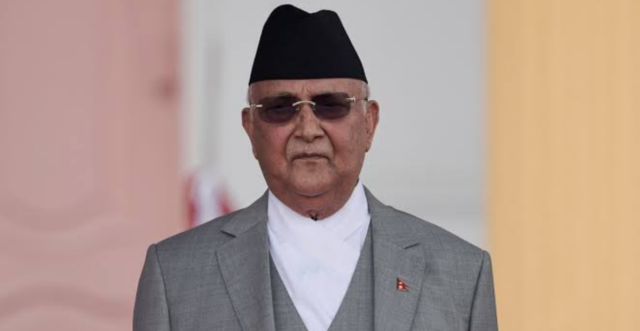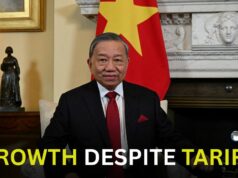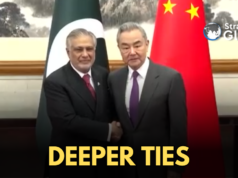As Nepal’s Prime Minister KP Sharma Oli embarks on the first overseas visit of his third term to China, a big question would have preyed on his mind. Will China give the nod to his government’s proposal, fundamentally altering the terms under which BRI (Belt and Road Initiative) projects in Nepal will be carried out?
He may have already got his answer given that Foreign Minister Arzu Rana is back in Kathmandu after meeting her counterpart, Wang Yi in Beijing. But reports from the capital are inconclusive.
Arzu Rana told journalists that BRI projects in Nepal would be implemented based on whatever consensus the two sides reach. She also said she told Chinese leaders about Nepal’s view vis a vis BRI projects
Some background would be useful here.
The BRI Implementation Plan proposed by Beijing in early 2020, has remained unimplemented. Note that Nepal had signed the framework agreement on BRI in May 2017, but since then not one project has been taken up (although China claims the Pokhara International Airport was a BRI project). The key issue it seems, was Chinese loans.
“Nepal will prefer grants instead of loans in the projects to be implemented under the BRI,” Dr. Prakash Sharan Mahat, NC spokesperson and former foreign minister told StratNewsGlobal.
Dr. Mahat said that the agreement could be signed during Prime Minister Oli’s visit to China, provided of course, the two sides are able to reach a consensus on the issue of grants.
The BRI Implementation Plan has seen sharp divisions among political parties in Nepal. Almost all the left-wing parties are in favour of BRI projects. The Nepali Congress (NC), which is in coalition with Oli’s CPN-UML (Communist Party of Nepal-Unified Marxist Leninist), is not opposed to the BRI but is against taking on any Chinese loans to fund them. This was sanctified at the top level of the NC during a meeting in July.
“Nepal’s public debt has been growing rapidly and the country cannot afford to take loans from China,” said Mahat, adding “That’s why, we have been insisting on grant at least in the first phase. China has promised a lot of grants in recent years which we have not received. China can provide those grants under the banner of BRI.”
Nepal’s public debt to gross domestic product (GDP) has reached 44 percent which is not alarming, according to international agencies like the International Monetary Fund (IMF).
International credit rating agency Fitch, which carried out its first ever credit rating of Nepal, said the country had “Strong Debt Affordability”. It said over 40% of government debt was external and highly concessional with an average maturity of nearly 13 years and average interest of about 1%.
But debt has risen sharply in recent years, therefore the preference for grants that will not add to Nepal’s repayment burden.
Sri Lanka’s situation in 2022, when the economy collapsed amid high external debt, of which a major chunk was Chinese, added to the sense of caution in Kathmandu.
The NC has taken the position that grants are better and maintained the stand, forcing its coalition ally the CPN(UML), to fall in line or see the coalition break down.
CPN (UML) Central Committee member Pradeep Gyawali, had proposed a way forward.
“We have to go ahead by signing a BRI cooperation framework instead of implementation,” he said during an interaction organised by a Kathmandu-based think tank, the Centre for Social Inclusion and Foreign Policy. “The issue of grants and loans should come when we negotiate for implementation of a particular project.”
He also expressed frustration about why discussions centered only on Chinese loans.
“We have seen countries whose economy suffered because of implementing the recommendation of the IMF,” he pointed out, warning that some people were seeing Chinese loans from an ideological lens only.
“Should loans be categorized as ‘democratic’ and ‘communist loan’ or ‘blue’ or ‘red loan,’” he asked.
The NC has not publicly opposed taking loans from any other country and institutions except China. Some foreign policy experts believe the NC’s hardened position on the BRI could help rewrite it, making it more favourable for Nepal and less concerning in New Delhi or Western capitals.
“Almost all communist parties in Nepal tend to say ‘Our China, good China’ and BRI implementation plan could be signed as proposed by China,” said Arun Subedi, former adviser to ex-prime minister Sher Bahadur Deuba “The NC’s intervention regarding the BRI has been crucial to ensuring that the BRI Implementation Plan is not being signed as wished by China only.”
In his view, Nepal should not even accept foreign grants if they don’t serve the national interest or injure the core interests of neighbouring countries. “Should we accept the Chinese grant if it is for building a military academy close to the Nepal-India border such as Kailali district,” he asked.
Vijay Kant Karna, head of the Centre for Social Innovation and Foreign Policy, wondered if a consensus on the changes Nepal was seeking, would be possible.
“Even if the document is not signed, a face-saving measure might be taken to ensure Nepal’s commitment to BRI,” he suggested.
The point here is less about Nepal’s commitment to the BRI and more about how it is implemented, in a manner that does not burden the country with debt. Arzu’s return suggests the Chinese may want the Prime Minister Oli to do the heavy lifting with possibly quid pro quos in place.
Prithvi Shrestha is Executive Editor, Arthik Abhiyan Daily





